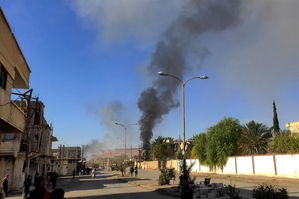Damascus, July 19: The Syrian interim government on Saturday began implementing the first phase of a ceasefire agreement in the embattled Sweida province, aimed at ending days of deadly sectarian violence between Druze groups and Arab tribal fighters.
According to official sources, the initial phase involves the separation of rival factions, the release of detainees, and the evacuation of hostages. A government emergency committee, comprising public institutions, has also been activated to deliver urgent humanitarian aid, restore services, and begin infrastructure repairs under phase two of the agreement.
The third phase will include a gradual redeployment of state institutions and internal security forces to restore order under central authority.
Despite the efforts, clashes reignited Saturday in western Sweida, breaking a brief lull in hostilities. The UK-based Syrian Observatory for Human Rights reported renewed gunfire and described the situation as “fragile,” raising fears of a total collapse of the truce, which was brokered earlier this week with international support.
Checkpoints have now been established outside Sweida’s administrative borders to prevent further infiltration by armed groups. However, the humanitarian situation is rapidly deteriorating. Sweida’s main hospital remains incapacitated due to prolonged power outages, medical shortages, and the breakdown of essential services like dialysis. Hospital staff issued a dire warning of a looming health crisis, citing unburied bodies and worsening sanitation.
Salkhad Hospital, the last partially operational medical center in the region, is also nearing shutdown due to lack of supplies.
Food, fuel, and water shortages are growing more severe, with thousands stranded in affected areas. Access to aid convoys remains blocked by ongoing clashes.
Since violence erupted on July 13, at least 940 people have been killed, including civilians, security forces, and tribal fighters. The death toll also includes casualties from Israeli airstrikes and alleged executions by both government and tribal forces.










